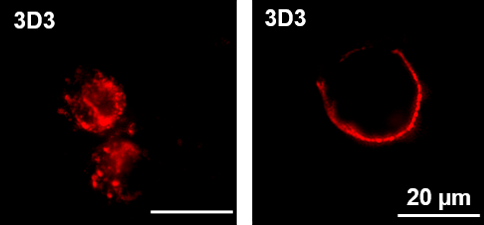Antibody technologies
Resource-Efficient Antibody Production
The Department of Drug Design and Target Validation develops specialized antibodies that bind selectively to modified forms of amyloid proteins. These antibodies hold great promise for future diagnostic and therapeutic applications in amyloid-related diseases, as they can distinguish disease-associated protein variants from their normal, physiologically functional counterparts.
This selective binding is crucial because amyloid proteins—such as transthyretin (TTR) and β-amyloid (Aβ)—exist in both pathological and natural forms within the body. In the case of ATTR amyloidosis, for example, these antibodies can specifically detect TTR fibrils deposited in the heart and nervous tissue without interference from circulating, physiologically active TTR. In Alzheimer’s research, they may be used in passive immunotherapy to selectively target harmful Aβ deposits in the brain while sparing the normal protein form.
To advance this innovative approach and enable preclinical studies, substantial antibody quantities are required (0.5–10 g/liter). However, current production methods are slow, expensive, and yield only small amounts (0.001–0.03 g/liter).
The project's goal is therefore to develop a highly productive master cell line capable of efficiently generating the necessary antibody quantities. Through a simple recombination process, new target proteins can be rapidly and cost-effectively integrated into this cell line. In the future, the master cell line will support both economical production of novel protein therapeutics and application-oriented basic research.
The joint project “OptimumAntibody: Resource-Efficient Antibody Production” is being carried out in cooperation with Anhalt University of Applied Sciences and funded by the European Regional Development Fund (ERDF) and the state of Saxony-Anhalt.
Project coordination: Mathias Schenk

Characterization of HERV envelope proteins with the aim of developing therapeutic antibodies for HERV-associated autoimmune and tumor diseases

Human endogenous retroviruses (HERVs) and, more specifically, their envelope proteins are suspected of transporting diseases such as multiple sclerosis, rheumatism and tumor diseases. The actual function of these specific factors is yet to be clarified. Cellular damage and the misdirected stimulation of the immune system caused by HERVs are presumed to be disease mechanisms. New findings should help shed light on the role played by HERVs in the emergence of autoimmune and tumor diseases.
As part of a joint research project with Halle University Hospital, researchers at Fraunhofer IZI were able to manufacture HERV envelope proteins using biotechnological methods and characterize their biological activity. These proteins also served as antigens for generating both polyclonal and monoclonal antibodies. Furthermore, the biological effects of HERV envelope proteins were able to be examined in cell cultures and experimental animals, and their immune-stimulatory properties characterized. Together with the project partners from Halle University Hospital, HERV sequences could also be identified in various tumor entities.
The research project is thus paving the way for new therapeutic procedures in the treatment of autoimmune and tumor diseases.
The project “Characterization of HERV envelope proteins aimed at developing therapeutic antibodies for HERV-associated autoimmune and tumor diseases” was funded by the European Regional Development Fund (ERDF) and the State of Saxony-Anhalt. The funding was awarded as part of the “Saxony-Anhalt SCIENCE – FOCUS” program, through which the State of Saxony-Anhalt supports specialist research activities and innovative research projects in the field of science.
Publications

Other projects
- DFG: “Identifizierung von Abeta-Peptid-Mustern im Gehirn von Alzheimer-Patienten mit neuen monoklonalen Antikörpern” (“Identification of Abeta peptide patterns in the brain of Alzheimer’s patients with monoclonal antibodies”) (2226/17-1ï SCHI 1437/4-1)
Applicant: Prof. Dr Steffen Roßner, Leipzig, and Dr Stephan Schilling, Halle/S. - DFG: “Enzymatische Regulation der Bioaktivität von CCL2 bei neuroinflammatorischen Prozessen” (“Enzymatic Bioactivity Regulation of CCL2 in Neuroinflammatory Processes”) (RO 2226/15-1ï SCHI 1437/2-1)
Applicant: Prof. Dr Steffen Roßner, Leipzig, and Dr Stephan Schilling, Halle/S.